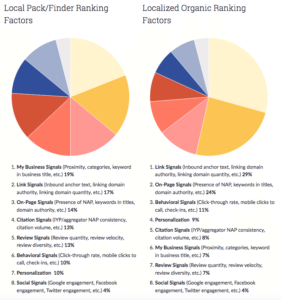Results for the 2017 Local Search Ranking Survey

There was no Local Search Ranking Survey in 2016, meaning the results for this year are more important than ever. Before turning to the results for this year and comparing them to 2015, it is necessary to understand why these findings matter to you.
Why Does Local Search Ranking Matter?
If you want to attract new customers to your local business, you need to ensure you are visible online. When prospects see your competitor in search results rather than your business, you miss out on a sale. Even if you are a large business with several branches, you need to utilize local search marketing to draw prospects to each one of your locations.
Maintaining a high ranking in local search requires ongoing effort, as best practices are always changing. To know what works and what is no longer effective, you need to turn to the data. This is where the Local Search Ranking Survey comes in.
Findings of the 2017 Survey

2017 Local Search Ranking Factors
Proximity
In 2014 and 2015, “Physical Address in City of Search” was the top local pack/finder ranking factor. This year, the most important is “Proximity of Address to the Point of Search,” moving up from position eight in 2014, and from position four in 2015. This change is unfortunate, as most businesses and customers would prefer that the best option, rather than the closest, be ranked highest in search results.
At the same time, other proximity factors — “Proximity of Address to Centroid of Other Businesses in Industry” and “Proximity of Address to Centroid” — have dropped in importance.
Links
It is clear that local SEO is highly dependent on links, as link signals are the second most important of the local pack/finder ranking factors and the most important of the organic ranking factors. To name just a few of highly ranked link factors, there are:
- Quality/Authority of Inbound Links to Domain
- Domain Authority of Website
- Quality/Authority of Inbound Links to GMB Landing Page URL.
All these show that Google still relies on links as an indication of authority for a business.
Citation signals
The importance of citation signals is difficult to compare to the previous survey, as there are now more citation factors. This means, if you just compare the factors from one year to another, citation signals appear to drop in importance, whereas this is actually far from the truth.
In 2015, only seven citation factors made it to the top 50 of local pack/finder ranking factors. This year, that number has risen to 10. Having said that, there has been a shift from quantity to quality in local SEO, meaning links are more significant than citations.
Google My Business signals
Many GMB factors from the previous years are absent from the 2017 survey. This is down to the fact that there are no longer editable descriptions on GMB listings. Top factors that remain are “Proper GMB Category Associations” and “Product/Service Keyword in GMB Title.” In addition, “Location Keyword in GMB Business Title” and “GMB Primary Category Matches a Broader Category of the Same Category” both rose.
Behavioral signals
For behavioral signals, only “Clicks to Call Business” and “Driving Directions to Business Clicks” are in the top 50 local pack/finder ranking factors. Bear in mind, however, that it is impossible to measure how many behavioral factors impact local search rankings by using SEO. Therefore, behavioral signals could be playing a much greater role than the survey implies.
Shortcomings of the Survey
While the Local Ranking Search survey is useful for showing local businesses where to focus their SEO efforts, it does have its limitations. In fact, to some extent, the survey may present a slightly distorted picture of reality. For instance, there are other factors (in addition to behavioral signals) that are difficult to quantify. Citation consistency is just one example.
Another limitation is that it is difficult to say how much has changed due to Google Possum, apart from “Proper GMB Category Associations.” Although the survey shows what businesses are focusing on, it fails to explain why.
How to Improve Your Local Search Ranking
All of the information from the survey is useful, but it may be too much for many businesses to process, especially small businesses and those with limited resources or marketing. To cope, there are a few factors you should focus on to ensure you rank on Google search results at all. These are:
- Proper GMB Category Associations
- Consistency of Citations on the Primary Data Sources
- Physical Address in City of Search
- Proximity of Address to the Point of Search (Searcher-Business Distance)
- Consistency of Citations of Tier 1 Citation Sources
Furthermore, unless you face very low competition due to your location and industry, you will only rank if you also focus on the following:
- Quality/Authority of Inbound Links to Domain
- Quality of Inbound Links to Domain from Industry-Relevant Domains
- Quality/Authority of Inbound Links to GMB Landing Page URL
- Quantity of Inbound Links to Domain from Locally Relevant Domains
- Quantity of Native Google Reviews (with Text)
Even if you are aware of all the above, it can be difficult to manage local search SEO alone. You will still need to make constant changes to keep your ranking.
A better option than trying to handle the task yourself is to turn to Boostability. Our white label local SEO services handle business profile management, local listings, and much more enabling your clients (and your own agency) to develop a strong presence online. Dedicate your in-house resources to tasks that only your staff can manage, and leave local search marketing to the experts by choosing Boostability.
